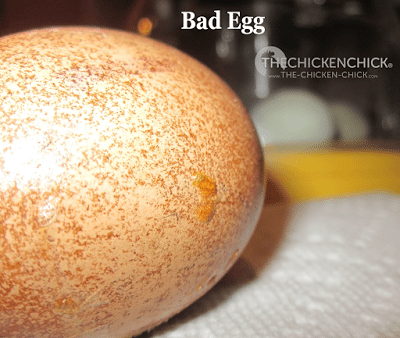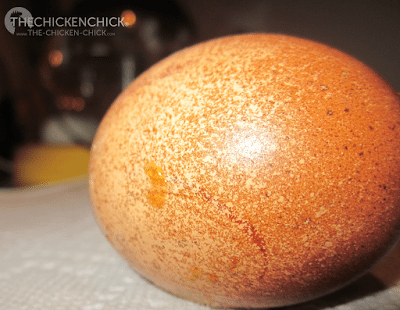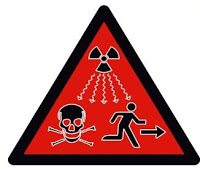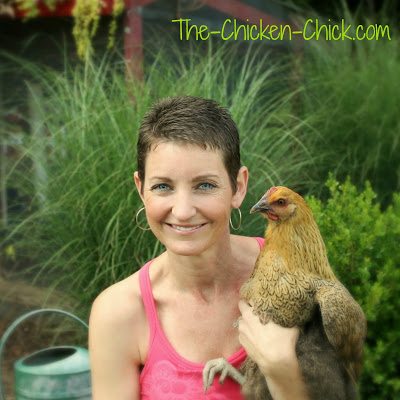Hatching addicts who have come across a rotten egg in their incubators never forget the smell. The odor is distinctive and unmistakable. Rancid does not begin to describe it. Why do incubated eggs go bad? Often, dirty eggs are the culprit. Bacteria from a dirty egg grows inside, turning the contents into a foul liquid, killing any embryo present. Gasses build up and generate pressure that may cause the egg to ooze or explode.
I rescued this egg from one of my fairweather broody hens, who had abandoned her nest after two weeks of sitting. The egg was no longer warm when I found it, which didn’t give me much hope for the embryo’s viability, but I placed it in my incubator hoping for the best a few days ago. Upon inspecting the eggs that had begun to hatch in the bator this morning, I immediately spotted the telltale, maple syrup-looking ooze that strikes fear into the heart of every hatcher. I knew what that innocent, honey-like substance signaled as I had seen it before. A stink bomb in danger of detonation. Must. Act. Quickly.
I took the egg out of the bator and placed it in two, zip-top bags and took it OUTSIDE. I’m just not a risk taker and the smell of a rotten egg is so pungent it could very well penetrate the confines of two sealed, plastic bags.
I always insist on knowing what lies within, so of course, I had to perform an eggtopsy (ie: crack that bad-boy open). My weapon of choice for this job is a heavy carving knife. I tap the blunt edge of the knife against the wide end of the egg (where the air sac would be) to crack it, being very careful not to puncture the bag. A nice, ripe egg will explode with balloon-like force and sound.
This egg, while rotten, did not explode. There was a well-advanced, decomposing embryo inside that, if given more time in the incubator, would have deteriorated further into greenish-black, liquified putresence. While I’m not ordinarily one to spare the photographic details of the graphic, I thought better of it this time. (you’re welcome)
When candling eggs, pay attention to any smell inside the bator to catch rotten eggs early. Bad eggs readily identify themselves and should be removed immediately.
Happy hatching!
Kathy Shea Mormino
Affectionately known internationally as The Chicken Chick®, Kathy Shea Mormino shares a fun-loving, informative style to raising backyard chickens. …Read on


shop my SPONSORS
Hatching addicts who have come across a rotten egg in their incubators never forget the smell. The odor is distinctive and unmistakable. Rancid does not begin to describe it. Why do incubated eggs go bad? Often, dirty eggs are the culprit. Bacteria from a dirty egg grows inside, turning the contents into a foul liquid, killing any embryo present. Gasses build up and generate pressure that may cause the egg to ooze or explode.
I rescued this egg from one of my fairweather broody hens, who had abandoned her nest after two weeks of sitting. The egg was no longer warm when I found it, which didn’t give me much hope for the embryo’s viability, but I placed it in my incubator hoping for the best a few days ago. Upon inspecting the eggs that had begun to hatch in the bator this morning, I immediately spotted the telltale, maple syrup-looking ooze that strikes fear into the heart of every hatcher. I knew what that innocent, honey-like substance signaled as I had seen it before. A stink bomb in danger of detonation. Must. Act. Quickly.
I took the egg out of the bator and placed it in two, zip-top bags and took it OUTSIDE. I’m just not a risk taker and the smell of a rotten egg is so pungent it could very well penetrate the confines of two sealed, plastic bags.
I always insist on knowing what lies within, so of course, I had to perform an eggtopsy (ie: crack that bad-boy open). My weapon of choice for this job is a heavy carving knife. I tap the blunt edge of the knife against the wide end of the egg (where the air sac would be) to crack it, being very careful not to puncture the bag. A nice, ripe egg will explode with balloon-like force and sound.
This egg, while rotten, did not explode. There was a well-advanced, decomposing embryo inside that, if given more time in the incubator, would have deteriorated further into greenish-black, liquified putresence. While I’m not ordinarily one to spare the photographic details of the graphic, I thought better of it this time. (you’re welcome)
When candling eggs, pay attention to any smell inside the bator to catch rotten eggs early. Bad eggs readily identify themselves and should be removed immediately.
Happy hatching!





























Hi
had to remove a bad egg this evening from the incubator – a small rom 20. Very bad smell. Hadn't checked in there for about ten days. The other eggs show signs of movement. but, i'm worried the incubator is infected as it still smells. Should I take the good eggs out and give it a quick wash? Or should it be ok? The eggs have 2 to 3 weeks to go
Jo
I probably wouldn't. As long as the egg didn't explode, you should be okay.
I have found one very smelly egg this evening and put it outside. I'm worried it may have been in there rotting for several days as it's ten days since I last looked inside the incubator. Could it be that the incubator is now infected. Should I take the good eggs out and give it a quick clean? Or should it be ok to just leave it?
Cheers
Jo
we let our hens set our eggs since we don't have an incubator but I candle them at 8-9 days to see if they are developing and anything not gets tossed. So far so good, nothing's exploded yet (knocking on wood)
I'm pretty sure I have one of the stink bombs you're describing. The incubator stinks terribly and there'd is clearsh yellow ooze coming out from one even though I don't see any holes. When I candle it, it looks like the others so I'm not totally sure if it's dead or not. The problem is that it's day 20 and some are already starting to chirp from inside their shell. I'm 90% sure this one is dead so I don't want to leave it in there to keep stinking or to contaminate the othrers yet also don't want to throw… Read more »
We just candled our first batch of eggs this week! Only 3 clear and 1 that had stopped developing. Thank goodness it hadn't started to stink! Sarah Holleran
Yay! New hatching addicts! Welcome to the club. How many did you set?